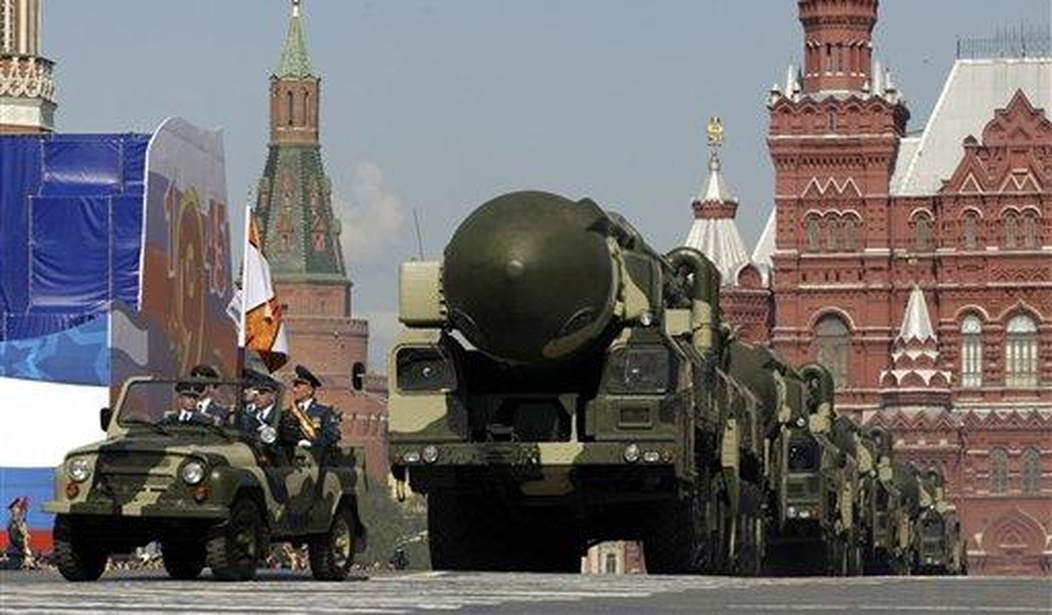To hear some critics describe it, the U.S. withdrawal from the INF Treaty is a disaster in the making.
“Dangerous, destabilizing and potentially counterproductive,”in the words of John McLaughlin, deputy CIA director from 2000 to 2004. Pulling out will “cause new tensions with European allies,” The New York Times opines. Adds the Stimson Center’s Michael Krepon in Forbes: “A new arms competition now beckons.”
Really? Let’s consider a few pertinent facts.
President Ronald Reagan and Soviet General Secretary Mikhail Gorbachev signed the Intermediate-range Nuclear Forces Treaty in December 1987. It prohibited the U.S. and the Soviet Union from possessing, testing and deploying ground-launched cruise and ballistic missiles with a range between 300 and 3,400 miles.
Signing the INF Treaty was in both nation’s national interests at the time. It permitted an entire class of weapons to be eliminated. But more than 30 years have elapsed. The world has changed. Russia, who inherited the treaty obligations from the Soviet Union, has been in violation of the treaty terms for at least five years. What was once a mutually beneficial arms control agreement is now serving no one.
The main objection to withdrawal is that it would encourage Russia and the U.S. to build more nukes and spark a new arms race. But that’s been occurring on the Russian side for a while now.
As The New York Times reported on July 28, 2014: “The United States has concluded that Russia violated a landmark arms control treaty by testing a prohibited ground-launched cruise missile, according to senior American officials, a finding that was conveyed by President Obama to President Vladimir V. Putin of Russia in a letter on Monday.”
Recommended
The Obama administration may have been good at voicing displeasure, but terrible at concrete actions or any sort of meaningful follow-through. Its fabled “reset” with Russia and the New START (Strategic Arms Reduction Treaty) signed with Moscow in 2010 drew plaudits from the media, but in the end, nothing changed.
So we’re supposed to keep ourselves shackled to a treaty that we comply with, but Russia doesn’t. Yet if we decide to end this untenable situation, we’re the bad guys? We’re the ones touching off a “destabilizing” arms race?
The ship has already sailed on that charge. And the ones to chastise are in Moscow, not Washington.
“Continued efforts by the U.S. government over the last five years to engage Russia to persuade them to return to compliance with the INF treaty have failed,” notes defense expert Thomas Spoehr. “All U.S. inquiries and efforts have been met with lies, deceit and denial.”
Adding to the problem of Russia’s cheating is a feature of the new world environment: China.
China wasn’t a party to the INF agreement. Of course, it wasn’t a rising military superpower in 1987. Now it is, and guess what? It’s already spurned an offer to join the INF Treaty. Beijing is more than happy to keep building its arsenals unfettered.
Today, China has the world’s second largest military budget. And it’s been augmenting its forces for some time now, including in areas that threaten American interests.
Under those circumstances, and with Russia refusing to stop violating the treaty, it makes no sense to continue being a party to it.
As Secretary of State Mike Pompeo recently said, the onus is on Moscow. But the government there only wants to complain, not change its behavior.
No wonder they preferred the Obama approach, which also relied primarily on words, not action. Fortunately, the Trump administration is trying a different tack.
If the president’s critics are worried about a “destabilizing” situation, they should be firing at Moscow, not the U.S. Things are already “dangerous.”
The first and sanest step we can take to change that is to stop pretending the INF Treaty has a role to play in preserving the peace in 2019.

























Join the conversation as a VIP Member